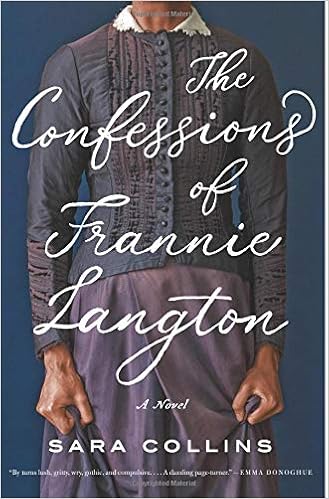The novel begins in 1826 in London. Frannie Langton, aka the Mulatta Murderess, is awaiting trial on charges of killing her employers, George and Marguerite Benham. Her lawyer asks her to help him defend her so she decides to write her life story.
Frannie was born a slave on a sugar cane plantation in Jamaica. Her master, John Langdon, is a pseudo-scientist,
a Josef Mengele character; determined to prove that blacks are a separate species,
he performs gruesome experiments. Having
been taught to read and write, Frannie is forced to be his assistant. Later she is brought to London where she
becomes a maid in the Benham household.
George is a renowned scientist interested in studies similar to John’s
and so keeps questioning Frannie about his experiments in Jamaica. Marguerite also takes an especial interest in
Frannie but for different reasons. Then
the two are found dead in their home, and Frannie is charged with their
murders.
Interspersed with Frannie’s story are excerpts from the testimonies of trial
witnesses and the journals of George Benham.
These third-person perspectives often clash with Frannie’s version of
events so the reader is left wondering about her reliability as a
narrator. There are certain topics she
refuses to discuss in detail (eg. the exact nature of the experiments Langton
performed on both the living and the dead) and she claims to have memory lapses,
so what else is she hiding? Frannie also
has a habit “which often weighted my limbs in those days, and made everything
thick and slow, including my thoughts” that affects her credibility.
Of course, it is Frannie who is the most interesting character. She is a fully developed character with
dreams and desires. It is her
intelligence that stands out most. Her
observations are often witty and astute.
For example, she comments “The white man is the measure of all things,
and of all things the measure is the white man” and “newspapers . . . travel
some distance to the rear of truth” and “Why is it that every white you’ll ever
meet either wants to tame you or rescue you?
What no one will admit about the anti-slavers is that they’ve all got a
slaver’s appetite for misery, even if they want to do different things with it.”
Frannie is not always a good person.
Understandably, she has been scarred by her experiences in Jamaica. For instance, she doesn’t believe that “’there’s
any such thing as an honest man.’” She
knows she has a great deal of potential but she is black and female and not
given opportunities to meet that potential.
She certainly suffers from anger and jealousy.
The book has echoes of various other novels; Margaret Atwood’s Alias Grace, Esi Edugyan’s Washington Black and Colson Whitehead’s The Underground Railroad come to mind. Readers may even think of Charlotte Brontë’s Jane Eyre. There are several literary allusions in the book
since Frannie is an avid reader.
The pace of the book is uneven.
I found the section in London to be slow. Certainly, Frannie’s relationship with the
Benhams must be developed but there is needless repetition. The author also wanted to add suspense to the
mystery (Did Frannie kill two people?) but there’s a fine line between arousing
suspense (by extending the rising action) and creating boredom.
Readers should be warned that the novel touches on a number of topics
they may find uncomfortable: slavery,
incest, addiction, sexual deviance. The perspective
of an educated black woman living in the early 19th century does,
however, make for interesting reading.

No comments:
Post a Comment